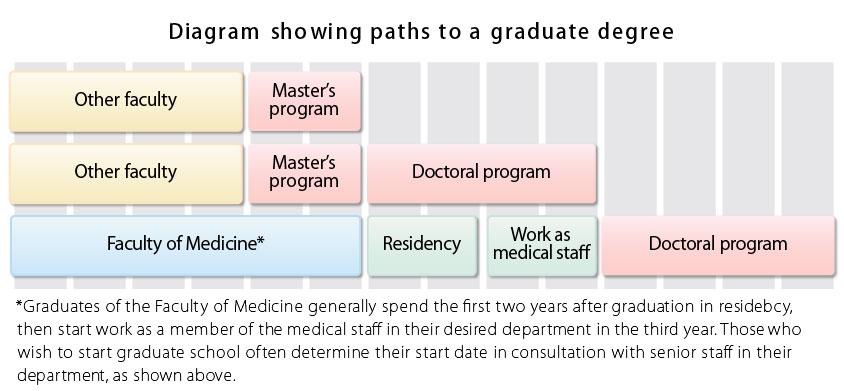Educational program of the Graduate School of Medicine
Overview
The Graduate School of Medicine seeks to promote people-centered healthcare by providing high-level education, train future professionals to meet community, academic, and international demands, and contribute to progress in medicine and healthcare in the 21st century.The goal of the program is to develop socially engaged doctors and researchers with high-level expertise who will conduct increasingly interdisciplinary and sophisticated academic research in order to sufficiently cover emerging medical and healthcare fields such as urban medicine, geriatrics, and gene therapy.
Paths to a graduate degree

Principles of the Graduate School of Medicine
-
Based on its founding principles of “Wisdom, Valor, and Benevolence”1, the Graduate School of Medicine trains professionals who will provide high-level medical care with an understanding of people’s concerns and challenges and a compassionate heart, as well as training leading global researchers who can conduct cutting-edge and innovative medical research.
1“Wisdom, Valor, and Benevolence” = Confucian virtues of 智(Chi), 勇(Yu), and 仁(Jin)
Ideal graduates
Students are educated in common core subjects, basic medicine, social medicine, and clinical medicine, following the learning map.Master’s program
- Non-physician medical professionals, researchers, and corporate staff with high-level cutting-edge medical knowledge and skills.
Doctoral program
- Highly innovative global medical researchers who are pioneers in cutting-edge research.
- Leaders who will spearhead basic or clinical research at universities and research institutes.
Diploma policy
Master’s program
Students who have completed at least two years (or at least one year for students with superior grades) of the Master’s program, earned at least 30 credit units including credits for required courses, received the necessary research mentoring, defended their Master’s thesis, passed the examination, and have been recognized as having “Wisdom, Valor, and Benevolence” in the following areas are awarded a diploma.- 1) Knowledge of biological phenomena, natural science, and medicine
- 2) Ability to contribute to progress in medicine
- 3) Willingness to work on the global stage with an international perspective
- 4) Respect for the sense of ethics necessary for medical research
Doctoral program
Students who have completed at least four years (or at least three years for students with superior grades) of the doctoral program, earned at least 30 credit units including credits for required courses, received the necessary research mentoring, defended their doctoral thesis after acceptance to an academic journal approved by the school, passed the examination, and are recognized as having “Wisdom, Valor, and Benevolence” in the following areas are awarded a diploma.- 1) Ability to plan, carry out, and disseminate cutting-edge medical research
- 2) Curiosity to discover previously unknown biological phenomena
- 3) Creativity to develop advanced medical treatments
- 4) Willingness to work on the global stage with an international perspective
- 5) Respect for the sense of ethics necessary for medical research
Doctoral thesis requirements
- Original article published in an academic journal.
- Sole author on an article, or first author on an English-language article published in an academic journal listed on PubMed, Science Citation Index Expanded, or SciFinder Scholar
Requirements for early completion
- First author on at least two English-language original articles, with the primary article published in an academic journal highly regarded in the field
- One secondary article published in an academic journal listed on PubMed, Science Citation Index Expanded, or SciFinder Scholar
- Notable superior research abilities and scholarship








